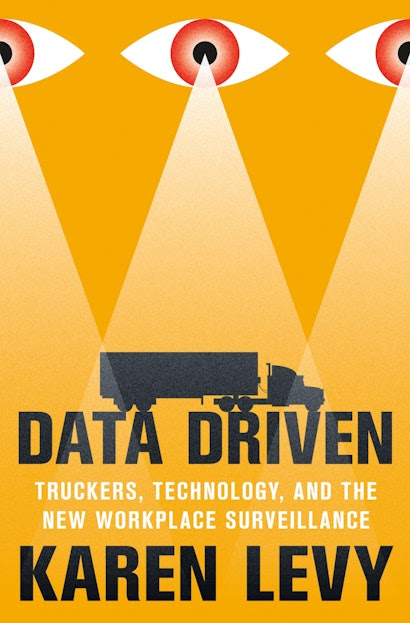Current and Past Winners

The 2022 McGannon Book Award Winner:
Karen Levy's Data Driven: Truckers, Technology, and the New Workplace Surveillance
The McGannon Center is thrilled to announce the winner of the McGannon Book Award honoring the best book published in 2022 that concerns media policy, activism, and social justice to Karen Levy’s Data Driven: Truckers, Technology, and the New Workplace Surveillance.
Previous McGannon Award Winners:
2021 - The Promise of Access: Technology, Inequality, and the Political Economy of Hope (MIT Press) by Daniel Greene (UMD College of Information Studies)
2020 - Hashtag Activism: Networks of Race and Gender Justice (MIT Press) by Sarah J. Jackson, Moya Bailey, and Brooke Foucault Welles.
2019 - Ghost Work; How to Stop Silicon Valley From Building a New Global Underclass (Houghton Mifflin Harcourt) by Mary L. Gray and Siddharth Suri
2018 - Automating Inequality (St. Martin’s Press) by Virginia Eubanks (University at Albany, SUNY)
2017 – No award given
2016 – No award given
2015 – Dark Matters (Duke University Press) by Simone Browne (University of Texas at Austin).
2014 – Low Power to the People (MIT) by Christina Dunbar-Hester (Rutgers, USC) and The War on Learning (MIT) by Elizabeth Losh (William & Mary)
2013 – No award given
2012- Why Americans Hate the Media: And How it Matters (Princeton University Press) by Jonathan Ladd (Georgetown University).
2011- The Googlization of Everything (and Why We Should Worry) (University of California Press) by Siva Vaidhyanathan (University of Virginia).
2010- The Death and Life of American Journalism (Nation Books) by Robert McChesney (University of Illinois) and John Nichols; and The Master Switch (Knopf) by Tim Wu (Columbia University).
2009- The Myth of Digital Democracy (Princeton University Press) by Matthew Hindman (Arizona State University).
2008- The Public Domain (Yale University Press) by James Boyle.
2007- The Future of Reputation (Yale University Press) by Daniel J. Solove (George Washington University).
2006- The Wealth of Networks (Yale University Press) by Yochai Benkler (Yale University).
2005- Investigated Reporting(University of Illinois Press) by Chad Raphael (Santa Clara University).
2004- Watching Jim Crow (Duke University Press) by Steven D. Classen (Cal State Fullerton).
2003- Campaigning Online (Oxford University Press) by Bruce Bimber (UC Santa Barbara) and Richard Davis (Brigham Young University).
2002- Media, Markets, and Democracy (Cambridge University Press) by C. Edwin Baker (University of Pennsylvania).
2001- Prometheus Wired (University of Chicago Press) by Darin Barney (University of Ottawa).
2000- Code and Other Laws of Cyberspace (Basic Books) by Lawrence Lessig (Stanford University).
1999- Inventing the Internet (MIT Press) by Janet Abbate (University of Maryland).
1998- Privacy on the Line (MIT Press) by Whitfield Diffie and Susan Landau.
1997- The Gordian Knot: Political Gridlock on the Information Superhighway (MIT Press) by L. McKnight (MIT), W.R. Neuman (University of Pennsylvania), and R. Solomon (MIT).
1996- Selling the Air (University of Chicago Press) by T. Streeter (University of Vermont).
1995- Breaking the News: How the Media Undermine American Democracy (Pantheon Books) by J. Fallows.
1994- Managing Privacy: Information Technology and Corporate America (University of North Carolina Press) by H. Jeff Smith (Georgetown University).
1993- “Conclusion” by R.W. McChesney (Wisconsin) in Telecommunications, Mass Media, and Democracy: The Battle for the Control of U.S. Broadcasting, 1928-1935 by R.W. McChesney (Oxford University Press).
1992- “Reconciling Economic and Non-Economic Perspectives on Media Policy: Transcending the ‘Market places of Ideas’” by R. M. Entman & S. S. Wildman (Northwestern) in Journal of Communication (Winter 1992).
1991- “The Periphery in the Center: The Information Age and the ‘Good Life’ in Rural America” by A. Calabrese (University of Colorado) in Gazette: The International Journal of Mass Communication Studies (April 1992).
1990- “The Deregulation of Telecommunications” by R. B. Horwitz (U.C. San Diego) in The Irony of Deregulation Reform by R. B. Horwitz (Oxford University Press).
1989- “Investigative Journalism and the Moral Order” by T. L. Glasser (Stanford University) & J. S. Ettema (Northwestern University) in Critical Studies in Mass Communication (March 1989).
1988- “World Television Trade: The Economic Effects of Privatization and New Technology” by D. Waterman (Indiana University) in Telecommunications Policy (June 1988).
1987- “Newsflow and Democratic Society in an Age of Electronic Media” by D. K. Davis (Southern Illinois University) & J. P. Robinson (University of Maryland) in Public Communication and Behavior Vol.II, edited by G. Comstock (Academic Press).